by Kathryn Baker ’23
I’ve already visited the Bremen Christmas markets twice, and it’s amazing. It is absolutely gorgeous at night and it always smells delicious. I would highly recommend trying the Schmalzkuchen and the Apfeltaschen! 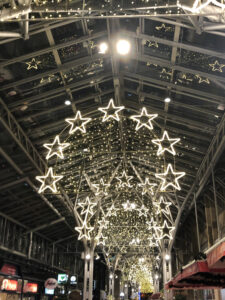

University of Bremen students listen up: Our new scholarship flyer for the academic year 2022-23 has arrived!
The flyer provides you with all the necessary information about our scholarship programs between Uni Bremen and Dickinson College.
You can download the flyer here.
We are looking forward to your application!
by Brendan Harlan ’22
Ever since I started planning to study abroad in Bremen, I wanted to live in a Wohngemeinschaft (WG). WG’s are shared apartments. From info sessions, professors, and conversations with other students who had or were studying in Bremen, I heard about the benefits to living in a WG. Mainly, your roommates can help you with learning German and immersing yourself in the local Bremen and Uni communities (if you choose to live with fellow students).
If you’re a student interested in studying abroad in Bremen, you will receive resources in the lead up to your time here to help you find a WG. However, another great resource in the meantime is another post here by Liam Pauli ’21. I hadn’t actually read Liam’s blog post before coming to Germany, yet somehow I actually found myself living on the same street that he did during his time in Bremen. I also used wg-gesucht to find a WG with a specific focus on finding a WG with a furnished room and fellow students living there.
I don’t know if it was just the ongoing COVID-19 pandemic or the fact that I’m only here for a semester or if it’s just normal, but I had a challenging time finding a WG. I applied to roughly 20-25 WG’s, received 8 responses, was invited to interview twice, and was finally offered a room in one of the WG’s who I interviewed with. It was an admittedly frustrating and time-consuming process, but I am quite happy with the WG I found and glad I put the effort into finding it.
Located in the Studentenwohnheim on Vorstraße, I’m just a 15 minute walk from the Uni campus and 5-10 minutes away from two different tram stops that can get me into the city center. I’m subletting from a Uni Bremen student that is currently on their own study abroad trip and I have three flatmates that are also students. Our current “thing” is watching the German TV show Tatort every Sunday.
Echoing what Liam wrote in his post and what other past Dickinson-in-Bremen students have said, I would wholeheartedly recommend living in a WG here. The search can be frustrating, but the results are worth it.
Photo credit: Durden Dickinson Bremen Program
by Brendan Harlan ’22
The Dickinson in Bremen (DiB) program has students begin their German abroad experience not in Bremen, but instead in another city. The German Fall semester doesn’t start until October, which is why it’s called the Winter semester, so Dickinson students have roughly five weeks between when they would usually start the Fall semester in Carlisle versus when classes begin in Bremen. That time is reserved for incoming DiB students to enroll in an intensive language course for four weeks, typically in a city of their choice. However, the ongoing COVID-19 pandemic meant that DiB arranged for us current students to join a program in the beautiful city of Heidelberg. I couldn’t have been happier though.
I spent four weeks in Heidelberg in a language program that met five mornings a week. The course I was in usually catered to people looking to work in Germany and needing additional language skills to do so. I learned German alongside future Uni students from South Korea and Ecuador, a future cook from China, and a future doctor from Iraq. I was the only native English speaker and the lone student from North America. However, I enjoyed learning more about Germany from my teacher and hearing about my classmates’ pasts as we practiced our German speaking skills.
The program in Heidelberg also provided housing to its students. I lived in a single room on the third floor of a house that was roughly a 20-minute tram ride from the program’s classrooms. My floor consisted of a small kitchen and tinier bathroom that I shared with two doctors-in-training from Turkey and a postgrad German Studies student from Alabama. It was here that I was introduced to my first Putzplan (cleaning schedule) and I had a difficult time rummaging through cleaning supplies with their purposes written entirely in German. My room was awesome though and when the skylight was open, I liked being able to hear the passing trams at the end of the street.
I enjoyed noticing things that clearly differentiated Heidelberg from any US city I’d been to. The German elections happened at the end of September, so virtually every light pole in the city had a smattering of political signs up. In the grocery stores, it was expected that you bring your own bag or pay for either a reusable bag or a paper bag. I somehow managed to shop at four different grocery store chains (Aldi, Rewe, Edeka, and Penny) in Heidelberg, though I found myself challenged at each by needing to bag my own groceries as fast as possible. And yes, public transportation here is awesome and despite a few close calls, I also managed to avoid getting run over by a bicyclist when I would accidentally stand in the bike lane.
My other favorite parts of my time in Heidelberg included exploring the Altstadt, getting coffee in the city, and the various meals I had in the city or at my house. I took my camera to the Altstadt multiple times, where I visited the Schloss (castle), Alter Brücke (old bridge), and Philosophenweg (Philosopher’s Way). My favorite photos of the Altstadt are already on this blog, so I won’t repeat post them here. The Altstadt was where I would see hundreds of tourists and I often (mentally) cursed the fact that Yankees hats are the fashionable baseball cap in Europe, not the Red Sox. I enjoyed a couple meals in the Altstadt too, including one with a view across the bridge and another beneath the shadows of one of the large steepled churches.
During the 20-minute daily break in my class, I would join my fellow students at the nearby Rieglers, a chain bakery/café where I could snag a cheap cappuchino and an Apfelstrudel for a snack (or breakfast). I also found a cool coffee shop called Kaffeezimmer, where I would go to study German or edit my photos while sipping at a coffee and eating cheesecake. The first time I went to Kaffeezimmer, I stumbled with my German and somehow said no thanks to the Wifi password, but it got better from then on.
I befriended three people living on the second floor of the house I lived in. The three included Uni Students from South Korea, the United Arab Emirates, and Germany. With the postgrad student from Alabama, the five of us shared some homecooked meals, where we would cook and talk together in both English and German. One night, I took over responsibility for choosing what to make for dinner, so we had hamburgers with an assortment of toppings and a copy-cat Big Mac sauce. We also had a night of Korean Kimbap, courtesy of the South Korean student, which I’d never had before but was crazy good.
After four weeks in Heidelberg, it was time to make my way to Bremen, to Bremen Hauptbahnhof.
by Kathryn Baker ’23
Before I arrived in Heidelberg, I didn’t know what to expect in terms of the German intensive course at the Heidelberger Pädagogium. I was especially nervous because I had not had any in-person classes since March 2020. My first day was definitely interesting and not what I had expected. In my course, the teacher only spoke German and there were people of all ages here to learn the language. In the beginning there were only 6 students, but as the weeks went by, there were more new people. After our first introductions, I figured out I was the only person whose mother language was English; other people spoke Spanish, Ukrainian or Mandarin. That forced me to only speak German with everyone because no one else spoke English, which was good.
Once the class was over at 12:15 pm, I had quite a bit of homework due each day. When I went back to my WG, I tried to finish most of my homework. With the helpful notes I took, and the online tutorial for extra help, the homework was much easier to complete. Once the first week was over, I could tell my language skills were improving immensely. The teacher made us speak many times in each class and we had many conversations in German. Even though I was extremely shy and worried about my pronunciation, I felt like I did pretty well. From 8:50 am to 12:15 pm, Monday through Friday, I spoke more German than I had in the past year with online classes. After the first week of class, I had my own routine. I took an earlier tram at 8:15 am and went to Rieger’s bakery right next to the Pädagogium. Most days I ordered a Schoko croissant, which was delicious.
Since this intensive course was only 3 and a half hours a day, I had plenty of time to explore Heidelberg. In my opinion, Heidelberg is one of the prettiest cities in Germany. I went to the Altstadt almost every weekend and explored. I bought some new Birkenstocks and window shopped in many stores along the streets. Every time I went, I had to buy some chocolate gelato or ice cream as well.
Overall I had a great time in Heidelberg and I’m happy that I learned so much with the language program!
Hallo from beautiful Heidelberg! This year’s Dickinson in Bremen students, Kathryn Baker ’23 and Brendan Harlan ’22 spent all of September doing intensive language courses in Heidelberg, Germany as a part of the Durden Dickinson in Bremen (DiB) program. Students typically choose the city in which they do an initial four week language program, but due to the COVID-19 pandemic, a course in Heidelberg was found this year for Kathryn and Brendan.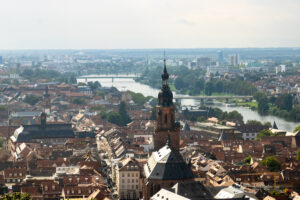
Heidelberg is known for its medical community and historic city center. The Altstadt, an old section of the city established in the Romantic time period, has been largely preserved. The Schlossruine (castle ruins) tower above the Altstadt, while the Alter Brücke (old bridge) leads across the Neckar River to the the Philosophenweg (Philosopher’s Way), where key historical German figures have walked in the past, such as Johann Wolfgang Goethe.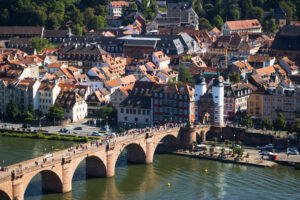
Kathryn and Brendan had a great time exploring Heidelberg and appreciated the chance to begin their German immersion experience through exploring the city and engaging in their language classes. Both would love to return to the city again (especially because Brendan misses his favorite coffee shop, Kaffeezimmer, while Kathryn misses the croissants at Rieglers).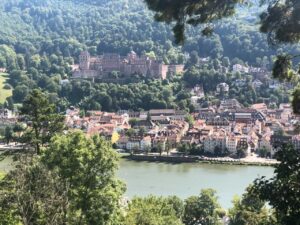
After the Breminale – Bremen’s annual music festival at the river Weser – had to be suspended last year due to the pandemic, the people of Bremen and everyone around can again look forward to 5 days full of music and other entertainment.
This year, however, with a slight twist: This summer, Bremen’s music festival runs under the name “Breminale – Dezentrale” (a phonetical wordplay – Dezentrale can be translated here as “decentralized”). Normally, the festival always takes place at the Osterdeich, directly next to the Weser, where every year a very long festival site is built. But this year, in order to comply with the COVID hygiene measures, the various acts take place in different places throughout the city.
What makes the festival so special is that it appeals to all age groups through its varied program, so that the whole city of Bremen can come together.
So finally again this year, from July 21 to July 25, 2021, the city of Bremen gets to enjoy a wide and diverse creative program filled with many different musical genres and bands from and outside of Bremen, which can be found here: https://breminale-festival.de/programm?tag=mittwoch
This year marks the 50th birthday of the University of Bremen. To celebrate half a century of Uni Bremen, the university offers a wide range of various events throughout the year.
The “50 reasons WHY” exhibition (in German: “WARUM? DARUM.”) throughout 50 different locations in Bremen, which started in March and will close in August, displays all of the achievements of people from and with the University of Bremen as well as where the Uni is involved and how it has changed Bremen since 1971. As of October, the exhibition will be brought together in the Lower Town Hall.
The fall program involves a wide range of research and teaching topics under the headline “CAMPUS CITY” which is scheduled from October 14, 2021 – 50 years to the day after the university was founded. More information about CAMPUS CITY will follow soon.
Moreover, Uni Bremen has set up the project “#IchBinUniBremen” (in English: “#IAmUniBremen”) in order to present the ‘human side’ of the University of Bremen: 50 different individuals affiliated with the University of Bremen give personal insights into its past, present and future. The project page and its social media sites can be found here:
https://www.uni-bremen.de/en/university/profile/history-1/50years/events
https://www.instagram.com/p/CPa4TTcC-wh/
Further information about 50 Years of University of Bremen can be found here:
by Dr. Janine Ludwig
At some point, the pandemic will be over, and we will be able to travel again. When that will be possible, we are looking forward to offering rich academic excursions for our students again, one of them our annual excursion to Berlin. Please see here what students can expect to see and learn in Germany’s capital:
Our Berlin excursion is usually centered around the once divided Germany, German and GDR history, culture, literature, and the process of reunification. We meet with politicians such as the last Premier, t.i. Chairman of the Council of Ministers, of the German Democratic Republic (DDR), Hans Modrow, and others. We visit the former headquarters of the Ministry of State Security (MfS, often called Stasi), including Erich Mielke’s office which is still intact. In the archives and basement, we look through authentic Stasi files and visit the former Stasi prison Hohenschönhausen. Of course, we also delve into current German politics, meeting the assistant of the governmental Coordinator for Transatlantic Relations in the State Department and attending parliamentary sessions.
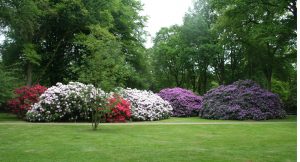 At the Rhododendronpark in Bremen, visitors get to enjoy one of the largest collection worldwide of these unusual, beautiful flowers: The park offers over 1,000 types of Rhododendron and Azalea bushes stretched over 46 hectares of parkland!
At the Rhododendronpark in Bremen, visitors get to enjoy one of the largest collection worldwide of these unusual, beautiful flowers: The park offers over 1,000 types of Rhododendron and Azalea bushes stretched over 46 hectares of parkland!
We highly recommend you to visit the park in the month of May: During this time of year, the Rhododendron starts to come into full bloom and shows its many vibrant colors.
For more information visit: https://www.rhododendronparkbremen.de/
Photo: Heinz-Josef Lücking, Creative Commons licence CC BY-SA 3.0 DE